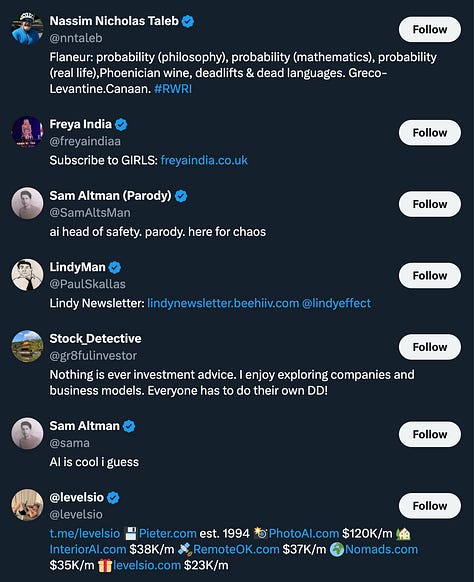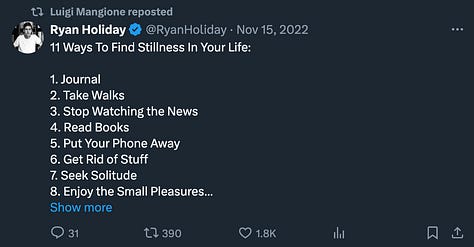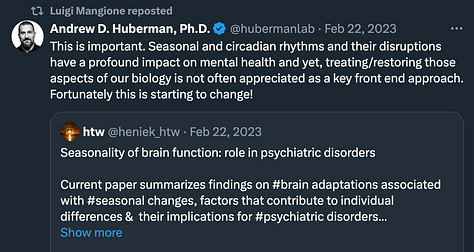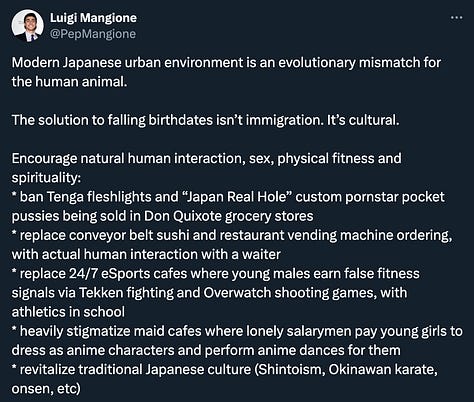Greetings from Read Max HQ! In this week’s edition, an attempt to assess the Type of Guy of the alleged shooter of UnitedHealthcare C.E.O. Brian Thompson, based on his Twitter account.
A reminder: the useless and pedantic knowledge and research that goes into a blog like this is enabled and supported by the generosity of paying subscribers. Their money makes up the vast majority of my income, and allows me to treat this newsletter as a full-time job--which means in turn I can inform, educate, humor, or, if nothing else, briefly distract you. If you find this newsletter at all interesting or valuable, please consider subscribing at roughly the price of one beer a month, or around 10 beers a year.
After a five-day manhunt that seemed to leave the N.Y.P.D. utterly stumped, a suspect in the killing of UnitedHealthcare C.E.O. Brian Thompson was arrested on Monday because a McDonald’s employee in Altoona, Penn., recognized him. The man, a 26-year-old University of Pennsylvania graduate named Luigi Mangione, was apparently carrying a gun, several fake I.D.s, and a manifesto; “it does seem he has some ill will toward corporate America,” N.Y.P.D. Chief of Detectives Joseph Kenny told reporters.
But what kind of ill will? Since Thompson’s assassination any number of tendencies across the online-politics spectrum have extended their support and sympathy for the killer. But while the message he left on the three shell casings police found near Thompson’s body--”Defend,” “Deny,” “Depose”--gives us some sense of motivation, it doesn’t tell us what we most want to know, which is what Type of Guy he was. Which influencers did he follow? Which weird online subculture did he adhere to? Was he a right-wing provocateur? A left-wing agitator? A school shooter? A Boogaloo Boy? An Antifa? A long-COVID patients’-rights terrorist?
As it turns out, the answer seems to be: None of the above. Mangione’s Twitter and GoodReads accounts, both of which were available for several hours today before being taken down, paint a very different subcultural picture from what I think most people might have expected--but no less a specific one, for that.
Here, e.g., are some selections from the list of accounts he follows:





Ezra Klein, Sam Altman, Edward Snowden, AOC, Jonathan Haidt, Bret Weinstein, Jash Dholani, John McAfee, Joe Rogan, and Steve-O: I recognize that not all of these are household names, but take my word for it that this is not the follow list of a D.S.A. member or a Black Bloc agitator or a Molon Labe guy or a NEET schizoposter. Almost no one on this list stands out as hard left or hard right, or even particularly “political,” as such. Instead, it’s a mix of bro-ish pop-science and self-improvement media personalities (e.g. Tim Urban and Andrew Huberman), tech “accelerationists” (e.g. “Beff Jezos,” Sam Altman, Leopold Aschenbrenner), secular cultural conservatives (e.g. Jash Dholani, LindyMan, Jonathan Haidt), anti-establishment-coded figures (e.g. Edward Snowden and A.O.C.), and people who are all of the above (e.g. Joe Rogan).
What does this add up to? I’ve seen some people suggest that Mangione’s politics must be “insane” or “incoherent” or “irrational,” and that may be true in some abstract sense, but I think the cultural and ideological portrait painted by his Twitter account is actually a fairly common and intelligible one, and would be pretty familiar not just to anyone who spends a lot of time on Twitter but to anyone who works in tech or frequents a gym weight room. It’s a loudly non-partisan, self-consciously “rational” mish-mash of declinist conservativism, bro-science and bro-history, simultaneous techno-optimism and techno-pessimism, and self-improvement stoicism--not left-wing, but not (yet) reactionary, either. The basic line is something like: The world is getting worse and phones are killing us; politics won’t save us but technology might; in the meantime, lift weights, take supplements, listen to podcasts.









This type of guy--the account Tolstoybb calls Mangione a “birthrates center-right pop science centrist type”--might be sort of boring to talk to at a party. But the thing is, he could go to a party or hold down a job and talk about his beliefs without raising any red flags. In other words, he doesn’t sound particularly strange, in the sense of foreign to experience. Nor does he come across as a “extreme”: Mangione’s beliefs, such as we can interpret them through his social media accounts, are pretty normal for a man of his age and background; they’re not those of the median American voter, precisely, but I suspect they’re pretty close to the views of the median 20-something white male tech worker. (Even his generous review of Ted Kazcynski’s manifesto is not particularly outré for people from his general cohort.) It’s the kind of worldview a curious but indiscriminate person might assemble out of the podcasts they listen to on their commute or during their workout in a particularly alienating period of life (i.e., your 20s).
Let’s be clear, though: This is not a “manosphere” situation. The Type of Guy we’re talking about here may or may not be a feminist, but he’s usually too smart and normal (and too likely to have sustained successful romantic and sexual relationships) to become a frothing Andrew Tate-type P.U.A. or devoted political misogynist. And while this Type of Guy sometimes has some overlap with the Zynternet, Mangione’s Twitter account shows no interest in sports, gambling, or light domestic beers, so I don’t think it’d be fair to call him a Zynternet assassin. (The main difference between Zynternet guys and this Type of Guy is that Zynternet guys are proud hedonists and podcast declinist guys like Mangione are usually ascetics of some kind.)
Instead he’s much closer to what Scott Alexander calls “the grey tribe” (“libertarian political beliefs, Dawkins-style atheism, vague annoyance that the question of gay rights even comes up, eating paleo, drinking Soylent, calling in rides on Uber, reading lots of blogs, calling American football ‘sportsball’, getting conspicuously upset about the War on Drugs and the NSA, and listening to filk”), the “post-rationalist” community known as “TPOT” (a kind of wall-eyed free-inquiry Twitter community that’s so annoying and difficult to sum up that I will have to devote a newsletter to it at some point), or even to the good ol’ Intellectual Dark Web, or at least its less overtly political tendencies (Mangione followed card-carrying IDW members Joe Rogan and Bret Weinstein): Conspicuously non-partisan, proudly self-disciplined, curious and eager for dialogue, a “high decoupler,” supposedly able to “separate ideas from their context,” making one able to soberly isolate variables, identify cause and effect in complex phenomena, and engage in more rational, non-emotional discussion about politics and culture.
(I recognize that these increasingly fine-grained typologies of disaffected 20-something men can get pretty tedious, but I offer this all up as a free overview for reporters wary of making the online subcultural version of NBC’s mistake in reporting that Mangione “played [a] video game killer” as a way of describing the cartoon party game Among Us.)
None of this, of course, explains why Mangione might 3D-print a silenced pistol and hunt down an insurance company executive, as cops claim he did. It’s hard to say that reading Tim Urban or listening to Andrew Huberman is particularly likely to drive someone to political assassination; we’re in the realm of pure speculation here, a mental break, possibly related back pain, seems much more likely to have been an operative factor than listening to a lot of self-improvement podcasts. But it does seem worth noting that the relatively benign techno-stoicist-declinist politics to which he seemingly subscribed can easily curdle into more sour forms of reaction and extremism, especially when they run up against difficult life circumstances. As John Ganz points out, in the same way that engineers might prefer officiously “rationalist” and “scientific” worldviews, they’re also particularly prone to direct action as the preferred mode of engagement with politics.




Cushy tech job from Ivy League education -> feels that he is beyond that, goes to co-work on a startup in Hawaii -> liberated, dabbles in mushrooms while hiking (podcasts say this is epic), is injured and realizes how expensive healthcare is without "a job" in America -> forced to reckon with his material condition for the first time in his life, shoots CEO.
The almost compulsive reasoning from first principles thing is a key trope of tpot people. You can see this in his comments on japanese urbanism etc.